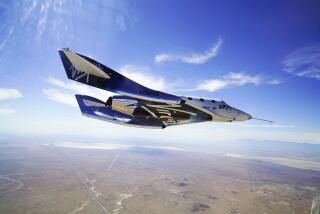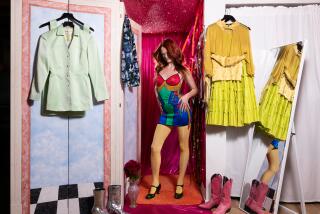Daring Young Man and His ‘Flying’ Machine
- Share via
Richard Branson built his London-based Virgin Group into the largest private company in Britain in part through creative marketing and shrewd publicity stunts. A master of self-promotion, Branson has drawn attention to himself and his companies with such adventures as a recent bid to circle the globe in a balloon. He is also a commercial pitchman for Virgin, appearing at promotional events and in print advertisements.
Founded as a mail-order record company 27 years ago, Virgin now encompasses goods and services ranging from cola drinks to wedding dresses, broadcasting to financial services. The 47-year-old Briton’s Virgin empire also includes hotel and restaurant development, Internet services, movie theaters, radio and television stations, and his boldest venture, a transatlantic airline. Branson will soon launch a clothing and cosmetics line.
The entrepreneur is still best known in the United States for his Virgin Atlantic Airways and Virgin Megastore, which sells CDs, videos and books. Six of Virgin’s eight U.S. stores are in California, but the company is planning to open nine new mega-stores in other states over the next few months.
Branson discussed his marketing philosophy and business plans during a recent interview with Times staff writer George White at the opening of a mega-store at Caesars Palace in Las Vegas. What follows is an edited transcript.
*
Q: Explain your marketing philosophy.
A: There are thousands of stores around the world and there are thousands of business openings. The press has a job to do. For example, a paper sends a photographer down to see a new Virgin store being opened. If I turn up in a suit and I merely sit there sipping sherry or champagne the whole time, the photographer’s going to go away without a picture. We don’t get our story on the front page.
However, make a fool of oneself occasionally--dress up in a pilot’s outfit if one’s launching a new airline, or wear a bridal gown--it makes people laugh and smile. Our employees work enormously hard and the least I can do is make sure that the world knows about it.
*
Q: The Virgin name is on the vast majority of your businesses. Do you see the Virgin name itself as a marketing tool?
*
A: Yes, we want the Virgin name to be synonymous with quality and good value. If people who fly our airline have a good experience, they’re more likely to try the mega-store. So when we promote one product or service, it rubs off on our other products. However, in America Virgin has still a long way to go before it’s a household name.
*
Q: You’re closely associated with Virgin. When people think of Virgin, they think of Richard Branson. Is that good?
*
A: Well, as a child my parents told me to keep a low public profile and to let what you do in life speak for itself. I followed that philosophy up until about 13 years ago when we started the airline. At that time, Freddie Laker [of the cut-price Laker Airways] told me: “The only way you’re going to beat American Airlines, United Airlines and British Airways is to get out and present yourself to promote your business.” I suppose things like my boating trips and ballooning trips have a positive effect on the companies.
*
Q: On the other hand, if something were to go awry in your personal life, wouldn’t that hurt the companies?
*
A: I think there’s always the potential downside if you build yourself up to build the companies up because there’s always the danger that you could have a big fall. I could do something stupid and fatal on a ballooning or boating trip, but the Virgin name is now strong enough to withstand something like that.
*
Q: How was the hot air balloon adventure good for your businesses?
*
A: Well, we don’t have “British Airways” on the balloon, we have the Virgin name on the balloon. It’s helped put Virgin on the map worldwide. “60 Minutes” did a profile of Virgin in America. I suspect they wouldn’t have done the profile on our businesses if it wasn’t for my boating and ballooning activities.
*
Q: You’re known for outlandish promotions. What would you say are your most successful stunts?
*
A: We constructed what appeared to be a UFO and flew over London at 4 a.m. on April Fool’s Day [in 1989]. It was so well-constructed that [the government] sent out the army and the air force.
Also, when we launched Virgin’s bridal shops, off came my beard and mustache and I found myself in this extremely sexy bridal dress throwing flowers to people. Everyone knows we’re in the bridal business now.
*
Q: This new store at Caesars Palace is part of a dramatic new expansion for Virgin Megastores. Given the fierce and increasing competition in the music and video store business, why are you expanding so rapidly?
*
A: The record industry is on a slight decline; but if you’re the best in any field, the best always does well. When we opened our first [U.S.] store in Los Angeles, we found that the Virgin Megastore concept works extremely well. That concept is having the broadest range of products in any one site; having places where people could just spend time browsing through books; and having listening stations where people can listen to the music before they actually buy the music.
We’re now developing the Virgin Megastore concept into a total entertainment concept. The next store we open in New York will have a 30-screen cinema. It’ll have an extremely good bookshop. It’ll have a very good restaurant. And it’ll have Virgin’s range in cosmetics and clothes.
*
Q: You’re known for dressing casually--even at formal affairs. Yet you’re now getting into the apparel business. I presume you won’t be selling suits?
*
A: No, it’ll be pretty casual.
*
Q: Why the apparel business?
*
A: As a brand, we’re known for being quite youthful. I think that casual clothes adds to the youthful image. We’ve got designers who we think can come out with designs that will give the big clothing companies a run for their money. We’re building record stores and believe the people who come to buy our records will also wear our clothes. We plan to marry the two businesses. It’s likely that we will have stand-alone clothing stores next to our record stores.
*
Q: You launched a cola line in 1994. Some have suggested the results have been disappointing thus far. Do you agree?
*
A: Well, we’ve only been in the business two years. We’ve just launched in France. And in those two years we’re now within about 4 [percentage points] of Pepsi’s market share there. In Britain, within 18 months of today we’ll overtake Pepsi. Within about six months we’ll be coming in a big way to America.
*
Q: What are you going to do to promote sales here?
*
A: Well, I think one of America’s biggest [army] tanks is currently being done up as a Virgin tank, which will roll into Times Square to launch an “attack” on Coca-Cola.
*
Q: You present yourself as the common man who takes on the establishment giants. Your publicity campaign against British Airways for Virgin Airways is an example. You’re a giant now yourself. Can you continue to play the underdog role?
*
A: Well, in each of our businesses the competition is generally a lot bigger than we are. Taking on Coke and Pepsi--a lot of people just didn’t believe someone could do that. We still have a long way to go before we’re the biggest in any industry. The public can still relate to the fact that we are shaking up these industries. We still are the underdog.
More to Read
Inside the business of entertainment
The Wide Shot brings you news, analysis and insights on everything from streaming wars to production — and what it all means for the future.
You may occasionally receive promotional content from the Los Angeles Times.









